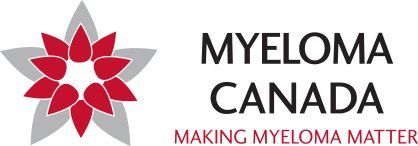A helpful guide to the terms and acronyms used on this website
Being diagnosed with myeloma can be frightening and overwhelming. On top of learning to navigate this new path, there are many new terms and abbreviations you’ll encounter along the way.
We’ve put together an evolving Glossary to help you understand the terms and abbreviations used by your healthcare providers. We hope this helps you feel prepared and empowered throughout each stage of your journey.
a.
- Accrual
- Acute
- Albumin
- Albuminuria
- Alkylating Agent
- Allogeneic
- Amyloid light-chain (AL) amyloidosis
- Amyloid/light-chain deposits
- Amyloidosis
- Analgesic
- Analog
- Anemia
- Anesthesia
- Angiogenesis
- Angiogenesis inhibitors
- Antibiotics
- Antibodies (immunoglobins)
- Antiemetic agent
- Antifungal agent
- Antigen
- Antineoplastic agent
- Apoptosis
- Appendicular skeleton
- Arthritis
- Aspiration
- Asymptomatic
- Asymptomatic myeloma
- Axial Skeleton
c.
- Calcium
- Cancer
- Cannabinoids
- Carcinogen
- Cardiac biomarkers
- Catheter
- CBC
- CD34+
- Cell
- Cell differentiation
- Cell proliferation
- Central line (central venous catheter)
- Chemotherapy
- Chromosome
- Chronic
- Clinical
- Clinical trial
- Cognitive Behavioural Therapy (CBT)
- Compassionate Access
- Compression Fractures
- Conditioning
- Conscious Sedation
- Contract research and site management organization
- Corticosteroids
- Creatinine
- Creatinine clearance
- Creatinine levels (kidney function)
- Cryopreservation
- CT or CAT [Computerized (Axial) Tomography scan]
- Cycle(s)
- Cyst
- Cytogenetic
- Cytogenetic Abnormalities
- Cytokine
m.
- M proteins (M spike)
- Maintenance therapy
- Malignant
- MDR (Multi Drug Resistance)
- Melanoma
- Metastasize
- MGUS (Monoclonal Gammopathy of Undetermined Significance)
- Molecule
- Monoclonal
- Monoclonal antibodies
- Monocyte
- MRI (Magnetic Resonance Imaging)
- MTD (Maximum Tolerated Dose)
- Myelodysplastic syndrome
- Myelosuppression
x.



